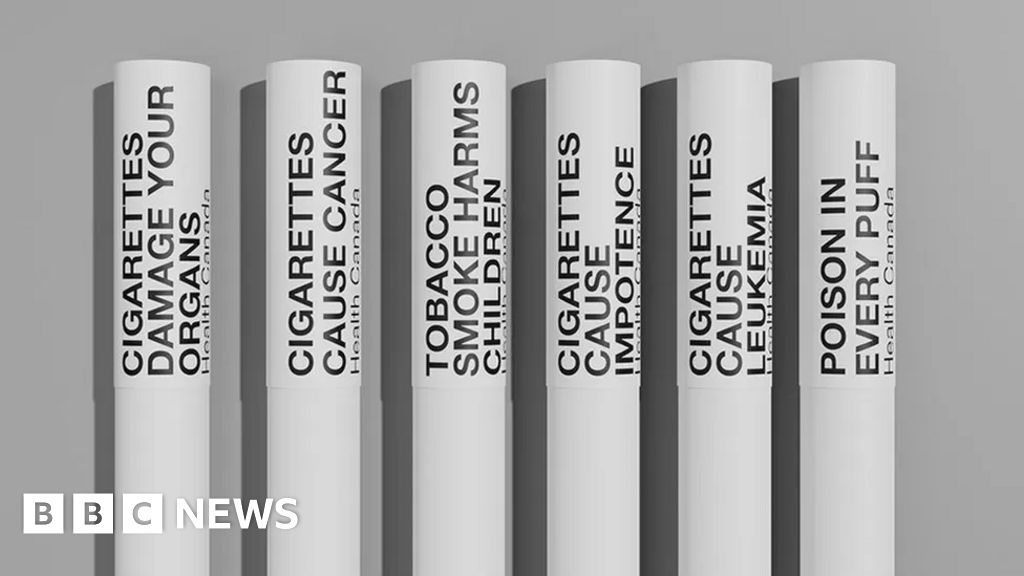- cross-posted to:
- [email protected]
- [email protected]
- cross-posted to:
- [email protected]
- [email protected]
Canada will be the first nation to start printing warnings directly onto individual cigarettes in a bid to deter young people from starting smoking and encourage others to quit.
The warnings, which will be in English and French, will include phrases like “Cigarettes cause cancer” and “Poison in every puff”.
The new regulations go into effect on Tuesday.
Starting next year, Canadians will begin to see the new warning labels.
By July 2024 manufacturers will have to ensure the warnings are on all king-size cigarettes sold, and by April 2025 all regular-size cigarettes and little cigars with tipping paper and tubes must include the warnings.
The phrases will appear by the filter, including warnings about harming children, damaging organs and causing impotence and leukaemia.
In May, Health Canada said the new regulations “will make it virtually impossible to avoid health warnings” on tobacco products.
A second set of six phrases is expected to be printed on cigarettes in 2026.
The move is part of Canada’s effort to reduce tobacco use to less than 5% by 2035 and follows a 75-day public consultation period that was launched last year.
Canada has required the printing of warning labels on cigarette packages since 1989 and in 2000 the country adopted pictorial warning requirements for tobacco product packages.
Health Canada said it plans to expand on warnings by printing additional warning labels inside the packages themselves, and introducing a new external warning messages.
Dr Robert Schwartz, of the University of Toronto, told BBC News it was good news that Canada was “moving forward with this innovation”.
“Health warnings on individual cigarettes will likely push some people who smoke to make a quit attempt and may prevent some young people from starting to smoke,” he said.
He also pointed to New Zealand, which has introduced very low nicotine cigarettes, as a leader in limiting the use of tobacco.
Mr Schwartz added: “These are the kinds of measures needed if we are serious about decreasing tobacco use.”
Tobacco use continues to kill 48,000 Canadians each year.
“Tobacco use continues to be one of Canada’s most significant public health problems, and is the country’s leading preventable cause of disease and premature death in Canada,” Public Services Minister Jean-Yves Duclos has previously said.
The Canadian Cancer Society, Canada’s Heart and Stroke Foundation and the Canadian Lung Association have all praised the warning labels, saying they hope the measures will deter people, especially young people, from taking up smoking in the first place.
Cigarette smoking is widely regarded as a risk factor for lung cancer, heart disease and stroke.
In Canada, the rate of smokers aged 15 years or older is around 10%, according to a national 2021 Tobacco and Nicotine survey but electronic cigarette use has been on the rise.



There’s no way the ink doesn’t make them even worse. I’ve always loved Canada’s over the top approach to visually discouraging smoking by hijacking half the pack with a picture. My favorite when I smoked cigarettes was the one with the kids giving you a judgemental look.
Given the numbers in this article, though, I’m not sure how well it’s working.
Even if it does, I doubt it’s very noticeable against the background terribleness.
One could say the same of the ambient air in much of Canada lately, but I don’t think pouring ink on the trees would better the situation.
Oh yes, the forest fires are terrible for that and other reasons. Stop burning fossil fuels everybody.
All of what Canada is doing(removing flavored cigarettes, removing logos and designs on packaging, banning advertising, warning labels on package and now the cigarettes) is to discourage teen smoking.
It’s working. Less and less teens are smoking(27% in the 90s, 14% in 2008, 5% in 2019 amd 3% in 2020).
In fact smoking is down across the board.
https://www.canada.ca/en/health-canada/services/canadian-tobacco-nicotine-survey/2020-summary.html